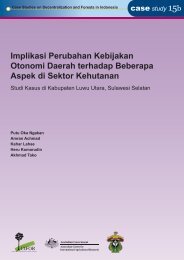Adaptive collaborative management of community forests in Asia ...
Adaptive collaborative management of community forests in Asia ...
Adaptive collaborative management of community forests in Asia ...
You also want an ePaper? Increase the reach of your titles
YUMPU automatically turns print PDFs into web optimized ePapers that Google loves.
146 • Eva Wollenberg, Ramses Iwan, Godw<strong>in</strong> Limberg, Moira Moeliono, Steve Rhee and Made Sudana<br />
Dur<strong>in</strong>g this cycle <strong>of</strong> activity, we also began work<strong>in</strong>g with the Community<br />
Empowerment Service (D<strong>in</strong>as Pemberdayaan Masyarakat Desa, PMD), rather<br />
than with the Plann<strong>in</strong>g Agency or the Forest Service. We shared more<br />
values regard<strong>in</strong>g <strong>community</strong> empowerment with PMD and this agency’s<br />
<strong>of</strong>ficials were enthusiastic about the collaboration. The possibilities for<br />
spontaneous cooperation therefore seemed more likely with PMD. As an<br />
example, PMD <strong>of</strong>ficials who jo<strong>in</strong>ed us <strong>in</strong> a monitor<strong>in</strong>g trip <strong>in</strong> October 2002<br />
used the opportunity to promote their Gerbang Desa Mandiri program,<br />
designed to promote village economic self-sufficiency. Travel<strong>in</strong>g together<br />
also built stronger relationships with villagers. Such collaboration can have<br />
its downsides, however. Dur<strong>in</strong>g a second monitor<strong>in</strong>g trip <strong>in</strong> May 2003,<br />
PMD’s agenda to redef<strong>in</strong>e village settlements dom<strong>in</strong>ated the process,<br />
requir<strong>in</strong>g our field team to make followup visits to many villages. We<br />
concluded that jo<strong>in</strong>t monitor<strong>in</strong>g made sense only when there was a shared<br />
agenda and our schedule was flexible.<br />
Meanwhile, the <strong>in</strong>action result<strong>in</strong>g from our collaboration with government<br />
seemed to be caus<strong>in</strong>g communities to lose their trust <strong>in</strong> us. We did not<br />
want to be accused <strong>of</strong> work<strong>in</strong>g <strong>in</strong>dependently on matters that should be the<br />
doma<strong>in</strong> <strong>of</strong> government, yet delays, a lack <strong>of</strong> responsiveness and <strong>in</strong>action <strong>in</strong><br />
implementation suggested that noth<strong>in</strong>g would happen unless we took the<br />
lead. As facilitators and a research organisation, we had limited scope for<br />
<strong>in</strong>terventions. In this way, the capacity <strong>of</strong> local government departments<br />
and their own bureaucratic requirements can pose severe limits to<br />
cooperation.<br />
One disadvantage <strong>of</strong> work<strong>in</strong>g more strategically and with a lower<br />
pr<strong>of</strong>ile was that our function became less visible and transparent. Some<br />
<strong>community</strong> members viewed the last stage <strong>of</strong> our work as redundant and<br />
unnecessary because we supported government programs like reforestation<br />
that they would have access to anyway. Communities also wanted us to<br />
work with the approval <strong>of</strong> the district government, despite understand<strong>in</strong>g<br />
that it was precisely this relationship that had stalled many <strong>of</strong> the villagers’<br />
<strong>in</strong>itiatives.<br />
We thus found our work <strong>in</strong>creas<strong>in</strong>gly boxed <strong>in</strong> by the need to make difficult<br />
trade<strong>of</strong>fs. For example, we were caught <strong>in</strong> the dilemma <strong>of</strong> how to move<br />
ahead with activities with communities while ma<strong>in</strong>ta<strong>in</strong><strong>in</strong>g our relationship<br />
with local government. We cont<strong>in</strong>ued to prioritise the relationship with local<br />
government, which was the most powerful actor and authority <strong>in</strong> the area.<br />
Yet this is a trap for <strong>collaborative</strong> approaches. It can cause them to stall <strong>in</strong>
















